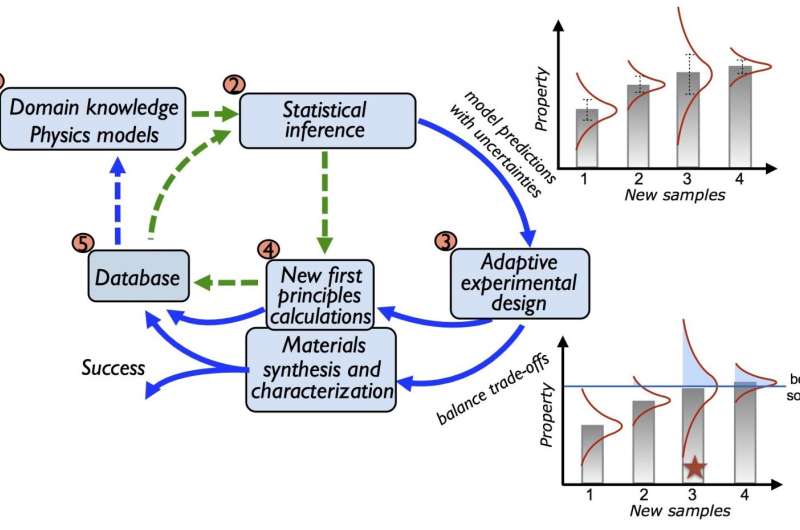Machine learning accelerates the discovery of new materials

Researchers recently demonstrated how an informatics-based adaptive design strategy, tightly coupled to experiments, can accelerate the discovery of new materials with targeted properties, according to a recent paper published in Nature Communications.
"What we've done is show that, starting with a relatively small data set of well-controlled experiments, it is possible to iteratively guide subsequent experiments toward finding the material with the desired target," said Turab Lookman, a physicist and materials scientist in the Physics of Condensed Matter and Complex Systems group at Los Alamos National Laboratory. Lookman is the principal investigator of the research project.
"Finding new materials has traditionally been guided by intuition and trial and error," said Lookman."But with increasing chemical complexity, the combination possibilities become too large for trial-and-error approaches to be practical."
To address this, Lookman, along with his colleagues at Los Alamos and the State Key Laboratory for Mechanical Behavior of Materials in China, employed machine learning to speed up the process. It worked. They developed a framework that uses uncertainties to iteratively guide the next experiments to be performed in search of a shape-memory alloy with very low thermal hysteresis (or dissipation). Such alloys are critical for improving fatigue life in engineering applications.

"The goal is to cut in half the time and cost of bringing materials to market," said Lookman. "What we have demonstrated is a data-driven framework built on the foundations of machine learning and design that can lead to discovering new materials with targeted properties much faster than before." The work made use of Los Alamos' high-performance supercomputing resources.
Although the Materials Genome initiative, issued by the White House Office of Science and Technology Policy in 2011, catalyzed interest in accelerated materials discovery, this study is one of the first to demonstrate how an informatics framework can actually lead to the discovery of new materials.
Much of the effort in the field has centered on generating and screening databases typically formed by running thousands of quantum mechanical calculations. However, the interplay of structural, chemical and microstructural degrees of freedom introduces enormous complexity, especially if defects, solid solutions, non-stoichiometry and multi-component compounds are involved, which the current state-of-the-art tools are not yet designed to handle. Moreover, few studies include any feedback to experiments or incorporate uncertainties.
Lookman and his colleagues focused on nickel-titanium-based shape-memory alloys, but the strategy can be used for any materials class (polymers, ceramics or nanomaterials) or target properties (e.g., dielectric response, piezoelectric coefficients and band gaps). This becomes important when experiments or calculations are costly and time-consuming. Although the work focused on the chemical exploration space, it can be readily adapted to optimize processing conditions when there are many "tuning knobs" controlling a figure of merit, as in advanced manufacturing applications. Similarly, it can be generalized to optimize multiple properties, such as, in the case of the nickel-titanium-based alloy, low dissipation as well as a transition temperature several degrees above room temperature.
More information: Dezhen Xue et al, Accelerated search for materials with targeted properties by adaptive design, Nature Communications (2016). DOI: 10.1038/ncomms11241
Journal information: Nature Communications
Provided by Los Alamos National Laboratory


















